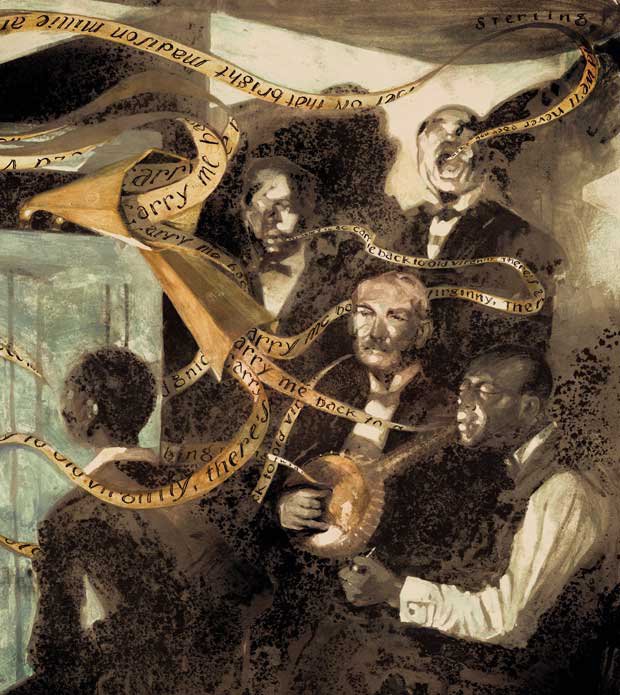Wherein illustrator STERLING HUNDLEY spotlights the career of singer and humorist Polk Miller, featured in April 2009 issue of Virginia Living

Polk Miller
Wherein illustrator STERLING HUNDLEY spotlights the career of singer and humorist Polk Miller
Illustrated by Sterling Hundley

Polk Miller
Wherein illustrator STERLING HUNDLEY spotlights the career of singer and humorist Polk Miller
Polk Miller was an unusual entertainer. Born James A. Miller in Prince Edward County on Aug. 2, 1844, he grew up on his father’s large tobacco farm, where some 200 slaves worked. As a boy, Miller spent a lot of time around the slaves on his plantation, listening to them tell stories and play banjo and fiddle music in their cabins. Miller later became a Confederate soldier, then, after the war, a pharmacist in Richmond. According to writer and researcher Doug Seroff, in 1892, at age 48, “he handed the drug business to his son Withers and launched a career on the public stage.”
A talented banjo player, Miller created a popular one-man touring show reflecting the life of the “old Virginia Plantation Negro” through music and sketches in the dialect of black slaves. There was no minstrel-like burlesque in the act—no blackface. He was said to be a “Negro delineator.” Thomas Nelson Page, a lawyer and writer, said Miller “can tell a Negro story and give the true Negro dialect better than any man living.” Miller also formed a quartet of black musicians and took them on the road. In 1909, Polk Miller’s Old South Quartette recorded seven songs for Edison Records, including “The Bonnie Blue Flag” and “Laughing Song.”
Seroff writes that Miller, who died in 1913, had a deep nostalgia for the old South and “saw himself as an apologist for slavery.” While that view is repugnant today, it was mainstream in Miller’s time, and even Mark Twain lauded the show as “about the only thing the country can furnish that is original and utterly American.” Collector Ken Flaherty Jr. released a CD of the Quartette’s faint Edison recordings, titled Music of the Old South, a decade ago. It was rereleased last year by Tompkins Square Records and nominated for a 2008 Grammy for Best Historical Recording.








